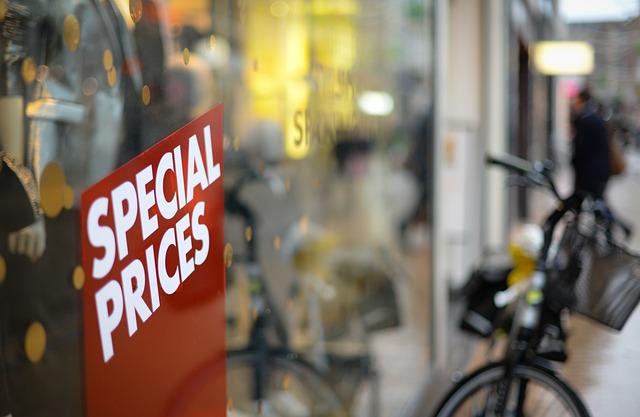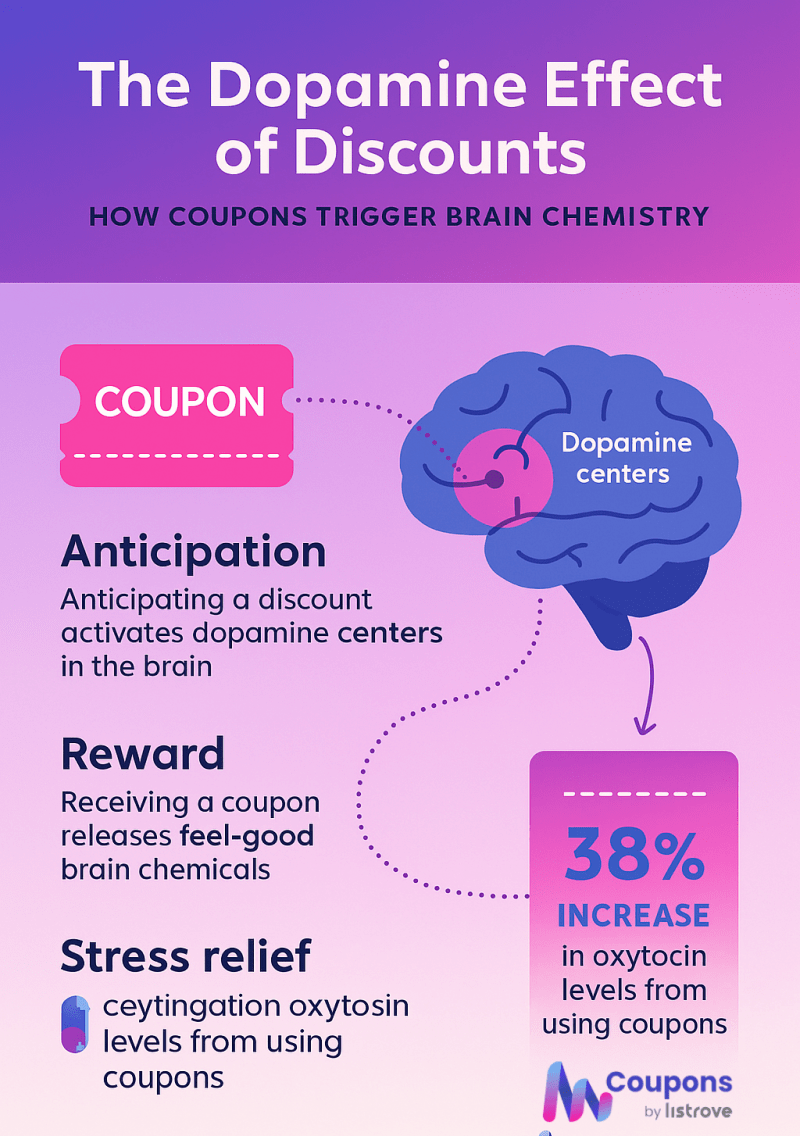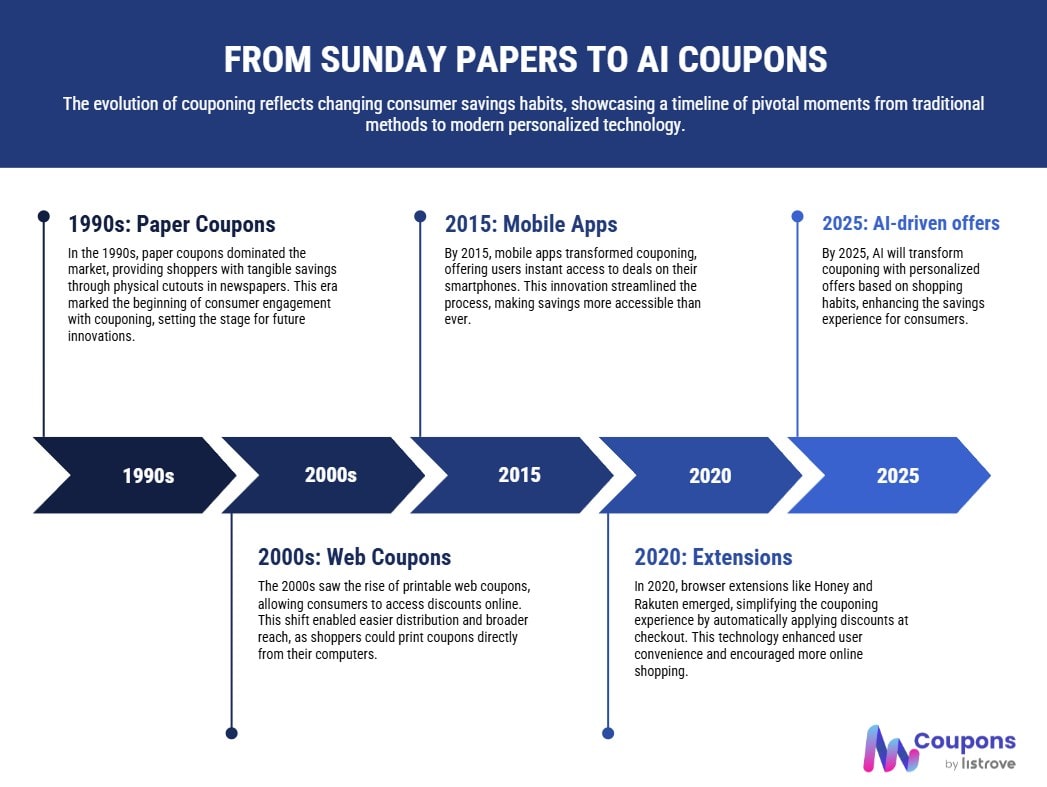The Psychology of Coupons: Why 86% of Shoppers Prefer Discounts Over Full-Price Purchases

In 2025, with inflation tightening household budgets and economic uncertainty looming, one shopping behavior continues to thrive: couponing. A staggering 86% of shoppers now prefer using coupons over paying full price, according to recent coupon clipping statistics. But this isn't just about saving a few dollars. The act of using a coupon taps into deeply rooted psychological and emotional triggers.
This article explores the psychology of coupons, combining behavioral economics, neuropsychology, and shopper behavior to uncover why people are so drawn to discounts. From dopamine releases to a sense of accomplishment, we'll dive deep into the science and stats behind this behavior and offer insights for businesses and marketers alike.
1. The Behavioral Economics of Saving Money
Behavioral economics explains why consumers make irrational decisions when money is involved. While traditional economic theory assumes people make logical decisions to maximize value, behavioral economics shows how emotions, perceptions, and cognitive biases often dictate shopping choices.
One principle that perfectly explains couponing behavior is loss aversion. People hate losing more than they like gaining. A coupon, even a small one, reduces the perceived "loss" of spending. It transforms a painful purchase into a feel-good moment of winning a deal.
Research Insight: According to a study from the University of Arizona, shoppers who used coupons experienced heightened levels of happiness and satisfaction compared to those who paid full price – even when the savings were minimal.
2. Dopamine and Shopping Behavior: A Neurological Reward System
When shoppers receive a coupon or apply a discount code, their brain releases dopamine – the same chemical triggered by enjoyable activities like eating chocolate or getting likes on social media. Dopamine is tied to anticipation more than the actual reward, which means even looking for a coupon can trigger excitement.

A 2012 study funded by Claremont Graduate University and Coupons.com revealed that people who received a $10 coupon experienced a 38% increase in oxytocin levels and had significantly reduced stress. Participants also had elevated heart rates and respiration, showing that the reward felt very real, both emotionally and physically.
3. Why People Use Coupons: The Emotional and Practical Triggers
Beyond the science, here are some core reasons why shoppers prefer discounts:
- Sense of accomplishment: Finding and applying a coupon gives users a feeling of being smart or resourceful.
- Control over spending: In a time where expenses feel out of control, a discount feels like regaining financial power.
- Fear of missing out (FOMO): Limited-time deals create urgency, which encourages immediate action.
- Validation and social proof: Sites like RetailMeNot or Honey show how many people used a code, reinforcing its value.
According to a 2025 report by Coupon.org, 67% of online shoppers abandon carts to search for a coupon code before finalizing their purchase. It's no longer a fringe behavior – it's embedded in the modern shopping experience.
4. Shopper Psychology and Digital Coupons: The Gameification of Saving
The rise of mobile apps and browser extensions has gamified the coupon experience. Apps that automatically apply the best coupons or reward users with cashback create loops of gratification, similar to video games.
Platforms like Rakuten, Honey, or Coupons.com often include features such as:
- Points systems
- Streak bonuses
- Referral rewards
This transforms shopping into a dopamine-fueled mission. The reward isn't just a better price – it's the achievement.
Stat Highlight: Digital coupon redemptions are projected to hit $90 billion by the end of 2025, up from $47 billion in 2020 (Statista).
5. Coupon Clipping Statistics 2025: Data Snapshot
Here are some recent statistics that further support the psychology of discounts:
- 86% of shoppers actively look for a discount code before buying (Coupon.org, 2025)
- 71% of Gen Z say they wouldn't complete a purchase without searching for a coupon first
- 60% of consumers feel disappointed if they buy something and later discover a coupon they missed
- 52% of shoppers say coupons help them try new products or brands they wouldn't normally consider
- 40% of users follow brands on social media just to access exclusive discount codes

These statistics don't just reveal behavior – they show how intrinsic discount hunting has become.
6. The Evolution of Couponing: From Scissors to Smartphones
Traditional paper coupons still exist, but their dominance has faded. Today's shoppers rely on:
- Digital wallets
- Coupon aggregator websites
- Browser extensions
- Email promotions and influencer codes
The psychological pull remains the same, but the method has evolved. Mobile-first coupon strategies now dominate, especially among younger demographics.
Behavioral Note: Mobile coupon users are more likely to convert because they can immediately act on a deal. Delayed gratification has a lower conversion rate.
7. How Brands Can Leverage Coupon Psychology for Growth
Understanding coupon psychology isn't just good for shoppers – it's crucial for businesses looking to grow.
Practical Tips for Brands:
- Offer time-sensitive coupons to trigger urgency.
- Use personalized discounts based on user behavior (AI-driven tools can help).
- Display social proof by showing how many people redeemed a coupon.
- Create gamified experiences like spin-to-win discounts or streak rewards.
The right strategy can turn a casual visitor into a loyal, repeat customer.
8. The Future of Couponing: Smart Discounts and AI Integration
Looking ahead, the next phase of couponing lies in personalization. AI algorithms can:
- Predict when a user is likely to churn and send them a coupon to retain them
- Recommend coupon codes based on past purchases
- Generate unique, one-time-use discounts to prevent abuse
Brands like Amazon and Walmart are already investing heavily in predictive coupon systems. Shortly, you may receive a coupon before you even realize you want to buy something.
Conclusion: Discounts as a Form of Digital Therapy?
The psychology of coupons goes beyond budgets. It taps into emotional, psychological, and social needs. For many, scoring a deal isn't just about saving money – it's a form of validation, control, and even joy.
As 2025 continues to shape a digital-first economy, businesses that understand the brain science behind coupons will be better equipped to build lasting relationships with their customers.
So next time you find a 10% off code and feel a little rush – know that it's not just you. It's dopamine. It's behavioral economics. It's human psychology at work.